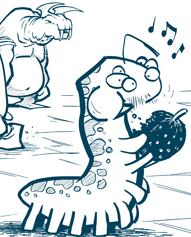Fillipods
| Fillipods | |
|---|---|
 A Fillipod eating a Winter Tilla Fruit, with Tesskans in the background. | |
| First appearance: | Page 0010 |
| Encyclopedia Xenobiológica entry: | Page 0102 |
| Information | |
| Homeworld: | FillaTresstanWhey (Tesskil) |
| Av. size: | 1.5m, 50 kg on average. |
| Diet: | Typically herbivorous. Omnivorous when completely necessary. |
| Av. lifespan: | 70-80 years |
| Intelligence rating: | Oscar/Papa range |
| First contact: | Late Tesskan-Human war |
Fillipods are a species from Tesskil. Unlike their counterparts, the Tesskans, Fillipods are known for their mental and artistic prowess, but poor fighting ability. Cuddow is a Fillipod aboard the Machito.
Enciclopedia Xenobiológica
Follow this link to get to the original: http://www.drivecomic.com/archive/110714.html [1]
Species
Fillipods
Homeworld
Tesskil ("FillaTresstanWhey" in Fillipod)
Size
Can vary widely. Average: 1.5 m long, 50 kg
Color & Markings
Fillipods are a colorful, 16-legged, arthropod-like creature with chameleon color adaptation, 6 mammalian-like eyes, a single antenna, and a brain distributed throughout the length of their body. But the only thing anyone ever wants to talk about is how Fillipods feel like Jell-O covered in microfiber. Entire body-pillow industries have sprung up on Earth, trying to recreate their unique, huggy feel.
Fliilpod are an immensely timid species, with virtually no natural defenses. "The best defense is a well-turned phrase," wrote the Fillipd poet Tessanananan, giving you an idea how easy they were to conquer. Fillipods do have one small defense, of a kind: Their single antenna can deliver a powerful, short-lasting sedative. Unfortunately, the sedative works even on Fillipods, when accidentally pricked by their own antenna. In is a source of endless pranks for teenage Fillipods.
Reproduction & Development
Fillipods are an intensely poetic and artistic people, crafting epic poems to one another over even tiny tasks, like, "Can you pick up some milk at the store?" With no natural predators, and summers filled with abundant fruit, Fillipod culture developed around ever more complicated interpretations of poetry, theater and painting.
Courtship, for example, can last decades, as entire poetic dissertations are written about the gentle arc of a loved-one's antenna, or as gigantic frescoes are painted to portray the unique way one's beloved chews their food. These painstakingly long years of art culminate in a 2-inute reproductive process... which in turn generates decades more art about how great it was. Very little gets done in Fillipod society.
That is, of course, until the Fillipods were conquered by the Tesskans, and their natural artistic inclinations were turned towards engineering, ship building, weapons development, and engine development: Areas they remarkably excelled in, given that they had no prior experience. Within two generations, they had created an entire industrial society from thin air.
Diet
Herbivores. Omnivores, when necessary.
Lifespan
70-80 years.
Language
Fillipods have an intensly complicated language, which almost no other species attempts to speak. They have since "dumbed it way down" (or "Tesskan'd it up" as their comedic playwright Nanontessnanon wrote) and have mainly adopted the language of the Empire.
Social Structure
Fillipod society, when they are left to their own devices, is structured almost entirely around gallery show openings, poetry readings, new plays, and the crafting of elaborate, poetic notes of apology as to why one can't make the opening night of a friend's new play.
Intelligence Rating
Extensively tested. In the Oscar/Papa range.
Interaction with Humans
Humanity wasn't even aware of Fillipods until the last days of the war with Tesskil. But in the years following the conquest, Fillipods have turned out to be excellent administrators throughout the empire, turning their eternal ache for poetry into tortuously long organizational memos.